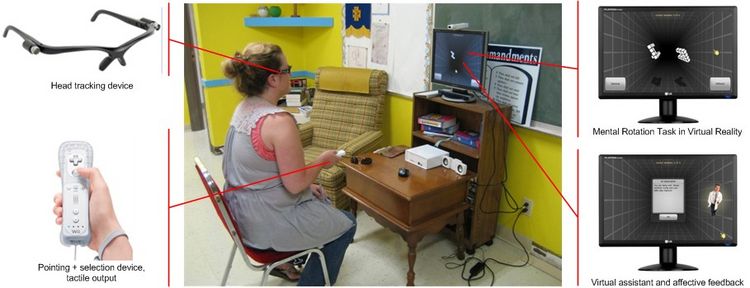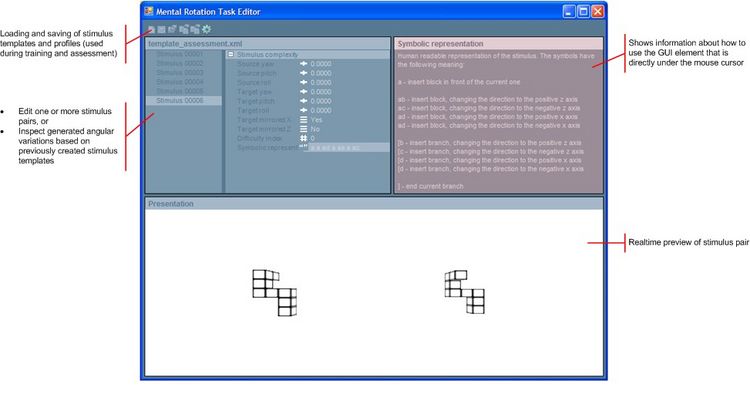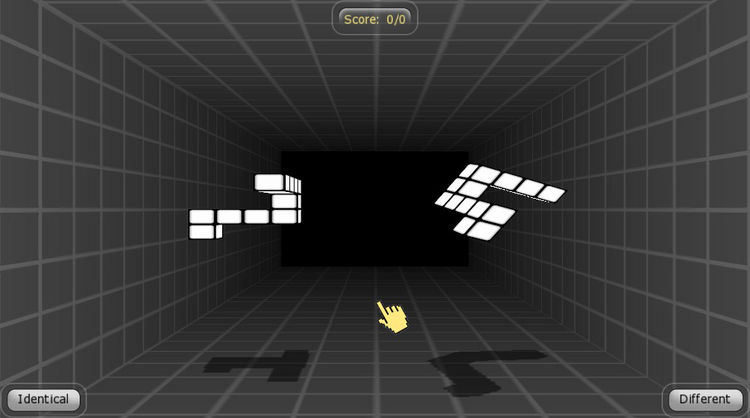Addressing Patient Motivation In Virtual Reality Based Neurocognitive Rehabilitation
Thesis title: Addressing Patient Motivation in Virtual Reality Based Neurocognitive Rehabilitation
Degree: Master of Science in Media & Knowledge Engineering
Department/Group: Mediamatics/Man Machine Interaction
Author: Alexander Sacha Panic
Student number: 1367803
Date: August, 2010
Examination Committee: Prof. Dr. M. Neerincx, Dr. Ir. W.P. Brinkman, Drs. P.R. van Nieuwenhuijzen
Abstract
Cognitive rehabilitation exercises are typically not designed to be motivating. The use of virtual reality and gaming technology can help with increasing the patient’s motivation and adherence. A physically active gaming experience leads to an increased adherence and affective attitude and an increased incentive to engage with healthy behavior. A psychological perspective on player motivation allows game design to explicitly focus on motivational variables, while affective gaming mechanisms allow games to infer the player’s affective state and change their content accordingly.
This research project investigated if neurocognitive rehabilitation exercises based on affective gaming and physically active interaction lead to an increase in motivation of elderly people, while improving their cognitive skills. Part of this project was carried out at the Sensory-Motor Systems (SMS) lab , under supervision of the lab’s director Prof. Dr. –Ing. R. Riener. The SMS lab is associated to the Swiss Federal Institute of Technology in Zürich, and the University Hospital Balgrist, Medical Faculty, University of Zürich, Switzerland. The goal of this project presented has been to develop and evaluate the hypotheses, methodology, and system prototype to enable the SMS lab to conduct a clinical experiment which investigates patient motivation in virtual reality based neurocognitive rehabilitation.
A prototype system was created consisting of an affective gaming based training and assessment environment for the mental rotation task. This prototype system was used in a pilot study with 9 able-bodied and healthy participants aged 55 to 80. The results support the hypothesis that use of affective game design elements (e.g. incorporation of high scores, achievement medals, adaptive difficulty, different game modes and offering affective feedback) is motivating to the elderly population to engage with rehabilitation exercises. The results also support the hypothesis that a physically active gaming experience (provided by e.g. embodied interaction mechanisms) is motivating to the elderly. However more data is needed for the results to be more conclusive.
The System Prototype: CogniPotent
During the course of this project a system prototype has been created. The virtual training and assessment environments are presented to the patient using a consumer grade computer attached to a TV screen, while gesture based input and tactile output is also possible using a Wii Remote as a pointing and selection device. The orientation and position of a user's head is tracked using cheap consumer grade hardware. This creates a novel setup in which any TV is transformed into a holographic surface, and can act as a catalyst for user motivation and engagement with any virtual environment that is presented.
| Image 1: By physically moving in front of the TV and using a handheld pointing and selection device, a patient can have a look at the stimulus from different viewpoints. |
|
Image 2: With a training-editor application clinicians can edit content of a patient's training or assessment session.
|
| Image 3: An example trial as presented to patients during a training session. |
Video 1: Below is a video which shows the system prototype used during the pilot study, in a simulated living room environment. Please note that this video has no sound, but the actual system prototype does.
<anyweb>http://www.youtube.com/v/PGlb1rzaWIU?hl=en&fs=1</anyweb>
Downloads
December 7th, 2009 - Intermediate project presentation: [1] These powerpoint slides were used during an intermediate presentation of the project and its progress so far. The presentation will be given at the ETH on December 7th, and has also been given in a lecture Man Machine Systems to graduate students at the DUT (faculty 3mE).
August 18th, 2010 - Research project (submitted) : [2] Final version of the research project surveying the relevant literature on the topics 'cognition and neurocognitive rehabilitation', 'virtual reality based neurocognitive rehabilitation' and 'affect, learning and games'
August 18th, 2010 - Thesis project (submitted) : [3] Final version of the thesis, submitted for defense.
August 25th, 2010 - CogniPotent v1.0: [4] The mental rotation task training and assessment software that was developed during the project, and used during the pilot study.
September 7th, 2010 - Thesis defense presentation : Powerpoint 2003 compatible [5] or PDF [6] format. These slides were used during the thesis defense.


